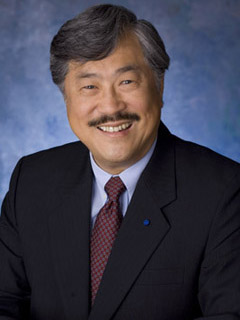KEYNOTE SPEAKERS LIST
1.James M.Tien, Distinguished Professor and Dean, College of
Engineering University of Miami, Coral Gables, Florida
2. Jaume Valls-Pasola, management and business administration
at the University of Barcelona (UB)
3.Philip M. Kaminsky, University of California, Berkeley
4.Keiichi Nakata, University of Reading, UK.
...............................................................................................................................................................................................................................................................................................................................................................................

James M. Tien,
PhD, DEng (h.c.), NAE
Email: jmtien@miami.edu
Distinguished Professor and Dean, College of Engineering
University of Miami, Coral Gables, Florida
Bio. In 2007, Dr. James M. Tien became a Distinguished Professor and the Dean of the College of Engineering at the University of Miami, Coral Gables, Florida. He received the BEE from Rensselaer Polytechnic Institute (RPI) and the SM, EE and PhD from the Massachusetts Institute of Technology (MIT). He has held leadership positions at Bell Telephone Laboratories, at the Rand Corporation, and at Structured Decisions Corporation (which he co-founded). He joined the Department of Electrical, Computer and Systems Engineering at RPI in 1977, became Acting Chair of the department, joined a unique interdisciplinary Department of Decision Sciences and Engineering Systems as its founding Chair, and twice served as the Acting Dean of Engineering. Dr. Tien has published extensively, been invited to present dozens of plenary lectures, and been honored with both teaching and research awards, including being elected a Fellow in IEEE, INFORMS and AAAS and being a recipient of the IEEE Joseph G. Wohl Outstanding Career Award, the IEEE Major Educational Innovation Award, the IEEE Norbert Wiener Award, the IEEE Richard M. Emberson Award, and the IBM Faculty Award. He received a Doctor of Engineering (honoris causa) from Canada’s University of Waterloo and is also an Honorary Professor at over a dozen non-U.S. universities. Dr. Tien is an elected member of the prestigious U. S. National Academy of Engineering.
Big Data: Unleashing Information
Abstract. At present, it is projected that about 4 zettabytes (or 10**21 bytes) of electronic data are being generated per year by everything from underground physics experiments to retail transactions to security cameras to global positioning systems. In the U. S., major research programs are being funded to deal with big data in all five economic sectors (i.e., services, manufacturing, construction, agriculture and mining) of the economy. Big Data is a term applied to data sets whose size is beyond the ability of available tools to undertake their acquisition, access, analytics and/or application in a reasonable amount of time. Whereas Tien (2003) forewarned about the data rich, information poor (DRIP) problems that have been pervasive since the advent of large-scale data collections or warehouses, the DRIP conundrum has been somewhat mitigated by the Big Data approach which has unleashed information in a manner that can support informed – yet, not necessarily defensible or knowledgeable – decisions or choices. Thus, by somewhat overcoming data quality issues with data quantity, data access restrictions with on-demand cloud computing, causative analysis with correlative data analytics, and model-driven with evidence-driven applications, appropriate actions can be undertaken with the obtained information. New acquisition, access, analytics and application technologies are being developed to further Big Data as it is being employed to help resolve the 14 grand challenges (identified by the National Academy of Engineering in 2008), underpin the 10 breakthrough technologies (compiled by the Massachusetts Institute of Technology in 2013) and support the Third Industrial Revolution of mass customization.
.......................................................................................................................................................................................................................................................................................................................................................
 Jaume Valls-Pasola
Jaume Valls-Pasola
Professor
University of Barcelona
Jaume Valls-Pasola. Professor of management and business administration at the University of Barcelona (UB). He was associate professor at the Universitat Politècnica de Catalunya until 1994 when he was appointed as professor by the University of Girona. During the period 1999-2001 he worked as UdG vice-president of economic affairs and planning. At that time he was the responsible for the launching of the University of Girona Science Park. In October 2006 he joined the UB where he is currently the director of the Business Administration and Management Department. Valls-Pasola’s main research interest is the field of innovation management and entrepreneurship. He has been involved in a number of international research projects (OCDE, FAST Monitor, TSER…). He has also carried out many research projects for the regional government of Catalonia concerning innovation in SMEs and the analysis of the regional system of innovation. Since 2007 Valls-Pasola is the director of the UB Entrepreneurship Chair. The chair coordinates the Barcelona week of the Summer School “Management of Creativity in an Innovation Society” (a joint project with HEC Montreal) and also the XEU network --a joint action of the nine regional public universities in order to promote entrepreneurship. His recent research includes the analysis of the R&D investment done by the largest companies in Catalonia and a project on success and failure factors of entrepreneurship activities.
Title: Innovation management: from industrial innovation to creative processes
Abstract:
Innovation management is an evolving field. Product innovation stills and important issue but in recent years many factors have had a huge impact in the way we understand and manage innovation within organizations.Our presentation will summarize and explore some of these factors that are keyto understand firm’s competitiveness. Among them: creativity, business models and the continuous flows and exchanges between industry and services in innovation processes.Concerning creativity, it has been widely recognized its importance and consequently research efforts have been oriented towards a better understanding of the phenomenon and the links between the development of new concepts and existing knowledge. This recognition of the role of creativity within innovative processes has taken place together with a widespread diffusion of the so-called creative industries and the concept of creative economy. From its side business models have been introduced in a massive way since the appearance of the canvas model ten years ago. Business models give a key role to innovation and have been useful to analyze “industrial” activities butalso any type of business. Networks and “internet of things” are also at the core of successful innovative activities. Finally we can mention the ground between product and services and its degree of interaction. Many innovations can be developed within the continuous flow between products and services and the unclear borders.
.......................................................................................................................................................................................................................................................................................................................................................
 Philip M. Kaminsky,
Philip M. Kaminsky,
Professor - Department Chair
University of California, Berkeley
Industrial Engineering and Operations Research
Email: kaminsky@ieor.berkeley.edu
Phil Kaminskyis Professor and Chair of the Industrial Engineering and Operations Research Department at the University of California, Berkeley, where he also serves as co-director of the Center for Entrepreneurship and Technology, and director of the Biopharmaceutical Operations Initiative. He received his PhD in Industrial Engineering and Management Science from Northwestern University. Prior to that, he worked in production engineering and control at Merck and Co. His current research focuses on the analysis and development of robust and efficient tools and techniques for design, operation, and risk management in logistics systems and supply chains, with a particular recent focus on the pharmaceutical and transportation industries. He is a co-author of “Managing the Supply Chain: the definitive guide for the business professional” and “Designing and Managing the Supply Chain: Concepts, Strategies and Case Studies." He has been an associate editor for Management Science, Production and Operations Management, Naval Research Logistics, Operations Research Letters, and IIE Transactions and has chaired various INFORMS prize committees. He consults in the areas of production planning, logistics, and supply chain management.
Title: Biopharmaceutical Production, Operations, and Supply Chain Management: Challenges and Opportunities
Abstract:
The biopharmaceutical industry is entering its fourth decade, and it has become a key component of the future of healthcare, delivering hundreds of novel therapies and vaccines today, with many more on the horizon. To achieve its vast potential, however, the industry must learn how to deliver its products efficiently and cost effectively in the face of a unique and challenging combination of characteristics. These include the uncertainties inherent in producing biological products, the regulatory complexities inherent in pharmaceutical production, the challenges associated with rapid technology change, and the planning difficulties associated with expensive, long lead time facilities. There is a tremendous opportunity for researchers in operations, logistics, and supply chain management to develop tools, techniques, and approaches to address the rich and varied issues facing the industry. We will introduce the industry, discuss key operations, logistics, and supply chain issues, and describe some of the tools and approaches that have been developed to address some of these problems.
........................................................................................................................................................................................................................................................................................................................................................................................................

Keiichi Nakata
University of Reading, UK
Associate Professor (Reader) in Social Informatics and Deputy Head of Business Informatics, Systems and Accounting (BISA) at Henley Business School, University of Reading, UK
Bio: Keiichi Nakata is Associate Professor (Reader) in Social Informatics and Deputy Head of Business Informatics, Systems and Accounting (BISA) at Henley Business School, University of Reading, UK. His main research interests lie in socio-technical systems, in the areas of computer-supported collaborative work, cognitive systems engineering, and information systems. Recently he has been engaged in research into technology acceptance, enterprise social media, and participatory systems, and uses organisational semiotics as one of the theoretical lenses. His recent research projects include semantic information aggregation and sentiment analysis of parliamentary records, and development of video-based distributed cognition analysis tools. He obtained his Ph.D. in Artificial Intelligence from the University of Edinburgh, UK, and M.Eng. and B.Eng. in Nuclear Engineering from the University of Tokyo.
Title: Exploring Information Fields: A Normative Representation of Contexts
Abstract:The treatment of context is a challenging issue in the design of any systems that are embedded within an operational environment.This includes systems that assume and rely on the existence of particular rules or norms that govern the behaviour of those whointeract with such systems, and relates to user expectations in system outcomes and interactions. It also has implications onservice innovation and engineering as service design would depend on the context in which services are developed. One approach toincorporate contextual conditions is to embed them within the interaction design. This, however, increases the complexity ofrepresentation and reduces the generalizability of design as it will need to be redesigned each time the context changes. In thistalk the notion of information fields that Stamper first proposed in 1973 is used to address the issue of context dependency basedon social norms. An information field is a set social norms that govern the behaviour of agents within it. This is a powerfulconcept as the behaviour of agents can potentially change depending on the information field, or where multiple information fieldsexist, they can be treated as supporting or opposing norms, i.e., a dynamic interaction between the norms. A formalism to capture and represent information fields is proposed to illustrate its expressivity.Exploring Information Fields: A Normative Representation of Contexts

